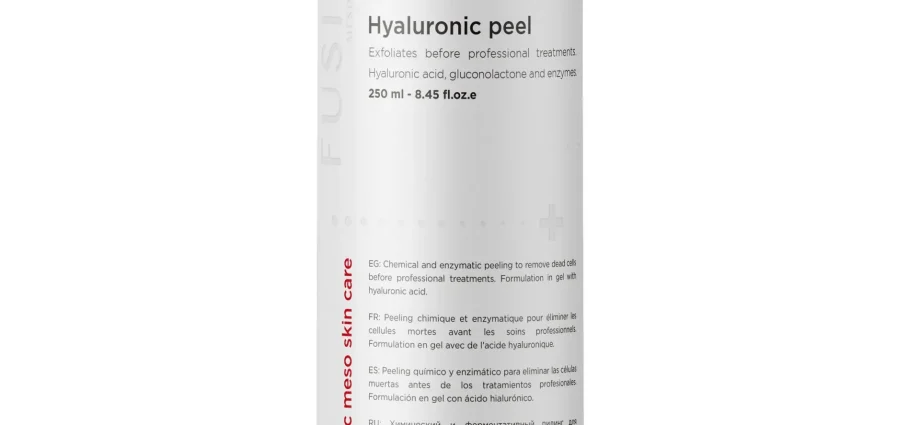Contents
“Wow! Need to try!” — beauty fans think when they see the name of a new skin procedure on the Internet. But does hyaluronic peeling really exist, or is it an invention of marketers? Let’s try to figure it out.
What is hyaluronic peel
Then the face is guaranteed a fresh and radiant look, and at the same time an even relief. (You can read more about peeling and its varieties here.)
Among the active ingredients of acid peeling are:
alpha hydroxy acids (ANA, fruit): glycolic, malic, lactic, tartaric, citric;
beta hydroxy acids (BHA): for example, salicylic;
lipohydroxy acid (LHA).
But hyaluronic acid – as well as ascorbic, nicotinic, and omega fatty acids – does not exfoliate. These substances have other strengths. If interested, they are listed in this article.
If you call a spade a spade, hyaluronic peeling does not exist. And it would be more correct to call the widely advertised procedure as follows: superficial peeling with fruit acids plus intensive moisturizing care with hyaluronic acid.
Hyaluronic acid properties
Moisturizes the skin on the surface, forming a film that prevents the evaporation of moisture, but allows air to pass through. This film also provides protection from many negative environmental factors.
Moisturizes the skin from the inside, integrating into the extracellular matrix, of which it is a part.
Stimulates the synthesis of collagen and elastin fibers. “It is hyaluronic acid that largely determines the elasticity, strength and optimal level of skin hydration,” says Elena Lykova, medical expert of the SkinCeuticals brand.
Actively participates in the processes of skin regeneration. For this, manufacturers of anti-aging cosmetics love her.
“Hyaluronic acid is found in the nervous, epithelial and connective tissues, in human biological fluids. And also in the skin, cartilage, bones, joints, heart valve, synovial fluid. Therefore, it cannot have a harmful effect on the body, ”explains Elena Lykova.
Hyaluronic acid cannot destroy the bonds between dead cells for their exfoliation.
Moisturizing the skin and maintaining moisture levels is the main purpose of hyaluronic acid.
When and who will benefit from products with hyaluronic acid
To make it clear whether you need products based on hyaluronic acid, check out the list of problems that it helps to solve.
Dullness of the skin.
Peeling and dryness.
Flabbiness and first wrinkles.
Pimples and post-acne.
Black dots.
Superficial pigment spots.
The effectiveness of hyaluronic peeling
The effectiveness of any peeling in combination with hyaluronic acid increases. After all, intensive hydration naturally awakens the skin’s own regenerative capabilities.
Beautician advice
Hyaluronic acid in a high concentration allows you to smooth out the inevitable and unpleasant effects of chemical peeling: redness, burning, peeling. The process of skin restoration, for which peels are carried out, begins almost immediately and is much more effective.
The skin is intensely hydrated.
Imperfections have been fixed.
Wrinkles are smoothed out.
Only a specialist should determine which concentration of fruit and then hyaluronic acid to use in each individual case.
The cosmetologist individually selects the type and concentration of acid for peeling and subsequent use of hyaluronic acid.
Preparatory stage
It is also advisable to use home care products with fruit acids in the evenings during the week before the procedure. To maximize its effectiveness.
Hyaluronic gel is applied to cleansed skin and aged for about 30 minutes, then removed. Hyaluronic acid penetrates more easily into the “naked” epidermis after acid cleansing, moisturizing and strengthening the skin from the inside. And on the surface, it helps to instantly reduce any post-peeling discomfort and avoid or reduce (depending on the depth of peeling) peeling and burning.
Post-peel care
Care after peeling implies several rules.
Intensively moisturize the skin with products based on the same hyaluronic acid (with oils, it is better to wait a bit after any peels).
Protect yourself from the sun.
Avoid temperature changes (for example, in a bath or sauna) and other stresses for the skin.
Reliable UV protection is required after any peeling, even with the use of hyaluronic acid.
Safety measures
There are some conditions and circumstances in which the peeling procedure is not worth doing.
Pregnancy and breastfeeding period.
Pronounced inflammatory process on the face.
Infectious diseases.
Allergy to any of the components involved in the procedure – often the hyaluronic gel is supplemented with other ingredients that are beneficial for the skin, which can cause individual intolerance.
Funds overview
As part of home care, you can also pick up pairs: a product with fruit acids plus a product with hyaluronic acid.
Duet by L’Oreal Paris
Name | Composition | Action |
Lotion-peeling Revitalift Laser X3 | glycolic and other fruit acids | Due to exfoliation of the skin improves complexion, reduces wrinkles, reduces pigmentation. |
Hyaluronic mask Revitalift filler [+Hyaluronic acid] | spheres with fragmented hyaluronic acid | Intensively nourishes the skin with moisture, restoring the hydrobalance, smoothing and tightening it. |
Duet by Lancôme
Name | Composition | Action |
Visionnaire Crescendo night two-stage peeling for facial skin | 1st phase: fruit acids, quinoa husk extract; 2nd phase: glycolic, salicylic acids | The first phase starts the exfoliation process and prepares the skin for the deeper action of the second phase. As a result, the skin is evened out and acquires a radiant tone. |
Absolue Precious Cells Rose Petal Revitalizing and Nourishing Mask | hyaluronic acid, rose water, rose extract, rose petals | Soothes and nourishes the skin, including after cosmetic procedures. |
A trio from SkinCeuticals
Name | Composition | Action |
Blemish & Age Solution Cleansing Toner for Mature Skin | glycolic, salicylic, capryloyl- salicylic acids | Helps eliminate dead skin cells from the surface of the skin. |
| night cream GLYCOLIC 10 RENEW OVERNIGHT | 10% glycolic acid, phytic acid, emollient complex | Stimulates cell renewal, restores radiance |
Intensive moisturizing regenerating gel Hydrating B5 Gel | hyaluronic acid, a component of the skin’s natural moisturizing factor, vitamin B5 | Intensively moisturizes the skin, promotes its regeneration. |










